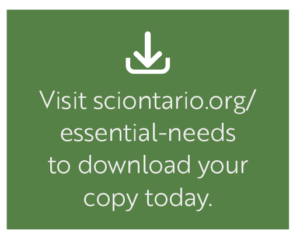Last year, the Essential Needs report was published, touching on the key differences between how each Canadian province handles public coverage for mobility devices, urinary supplies, and attendant services. To access our full report, visit SCIO’s website and download your copy.
We are pleased to be moving forward with Essential Needs phase two, where we will look at how to create international comparisons on how Canada is performing with essential needs against other similar countries around the world. Our goal with this work is to highlight in an evidence-informed manner how Canada supports people with SCI with essential needs with hopes to prevent anyone in the country from being inappropriately served for bladder management and assistive devices.
Peter Athanasopoulos, Director of Public Policy at SCIO, touches on the importance of this project as it pertains to the SCIO community.
What are some of the key things that were achieved in phase one of the Essential Needs report?
 We looked at public coverage from province to province as well as differences in service delivery. This is an important area of research for the SCI community because if a person with an SCI does not have access to the right supports, it can cost them their life.
We looked at public coverage from province to province as well as differences in service delivery. This is an important area of research for the SCI community because if a person with an SCI does not have access to the right supports, it can cost them their life.
We conducted a review of public policies and practices in each province to examine the provision of attendant services for activities of daily living (ADL), neurogenic bladder and bowel supplies (NBBS), and power and manual wheelchairs (WCs).
We assembled a team of experts with diverse areas of expertise, including healthcare providers, SCI researchers, and representatives from advocacy organizations, to define what a Canadian SCI in-patient rehabilitation model should include, in relation to assistive devices and access to medical supplies.
What are you hoping will be achieved with phase two?
In phase two, we will be looking at comparisons at how Canada is providing support when compared to other similar countries.
We also hope to engage the federal government on how to establish consistencies from one province to the next and how essential needs support SCI. Phase one taught us that there is no consistency under the universal healthcare system; there is too much autonomy and no federal regulation on how coverage is established.
The outcome we hope to achieve is better services and coverage for SCI regardless of where you live.
How does research like this impact the SCIO community?
It helps us study the impact of how systems and services supporting people with SCI are being utilized, what the gaps and barriers and opportunities are and how we can do better in an evidence informed way.
We know there are wide discrepancies, inequities and inadequacies related to initial SCI rehabilitation and provision of essential SCI-specific health equipment exists across Canada. A research-based strategy is required to inform the development of a consistent standard of practice.. It requires engaging with stakeholders to ensure a comprehensive approach and can include providing funding for specialized equipment, improving caregiver support and education and increasing community integration based on accessibility for people with SCI.
How can people from the community get involved to actively support the initiative?
By engaging in the research process, utilizing the report to have meaningful conversations with decision-makers and sharing the report to bring awareness to the needs of people in our community.






